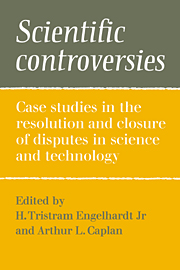 Scientific Controversies
Scientific Controversies Published online by Cambridge University Press: 03 February 2010
Definitions of closure
Can ethical theory be employed to close or settle controversial moral problems? Could there be a policy or method for achieving closure on these problems? Answers to these questions depend somewhat on the sense of the term closure under consideration. Accordingly, I shall first discuss possible meanings of this term. I shall not, however, confine the analysis to the ordinary English meanings of the term, which often incorporate too many senses and fail to make distinctions important to philosophical argument. The term closure fails to distinguish, for example, between termination of controversy by final resolution and termination that stops short of either final resolution or truth. Accordingly, an analysis of the complex English usages of this word would in all likelihood prove fruitless.
My procedure will be the following: I first examine five distinct senses of closure. I then concentrate on the fifth definition, which is stipulative. I make no pretense that this fifth sense is either descriptive of ordinary English, or reforming (uncovering some deeper meaning), or the only important sense of the term. Stipulative definitions do not constitute profound philosophy, but both stipulation and comparison to alternative definitions can introduce clarity and reduce misunderstanding. These are my initial purposes. I shall then take the fifth stipulated understanding of closure and use it to develop a policy for achieving closure.
In all cases, closure is an outcome, not a process, for closure is the termination of a controversy. However, we cannot escape asking what processes lead to this outcome and, correspondingly, what the different senses of closure are.
To save this book to your Kindle, first ensure [email protected] is added to your Approved Personal Document E-mail List under your Personal Document Settings on the Manage Your Content and Devices page of your Amazon account. Then enter the ‘name’ part of your Kindle email address below. Find out more about saving to your Kindle.
Note you can select to save to either the @free.kindle.com or @kindle.com variations. ‘@free.kindle.com’ emails are free but can only be saved to your device when it is connected to wi-fi. ‘@kindle.com’ emails can be delivered even when you are not connected to wi-fi, but note that service fees apply.
Find out more about the Kindle Personal Document Service.
To save content items to your account, please confirm that you agree to abide by our usage policies. If this is the first time you use this feature, you will be asked to authorise Cambridge Core to connect with your account. Find out more about saving content to Dropbox.
To save content items to your account, please confirm that you agree to abide by our usage policies. If this is the first time you use this feature, you will be asked to authorise Cambridge Core to connect with your account. Find out more about saving content to Google Drive.